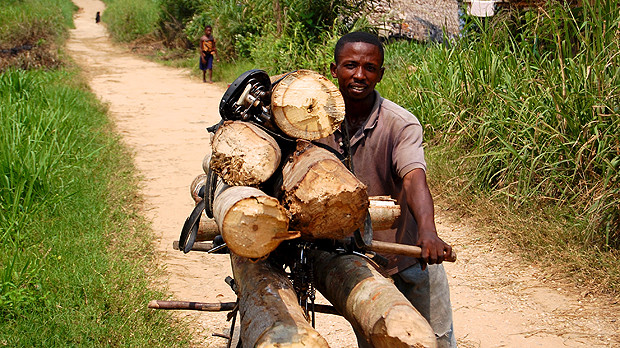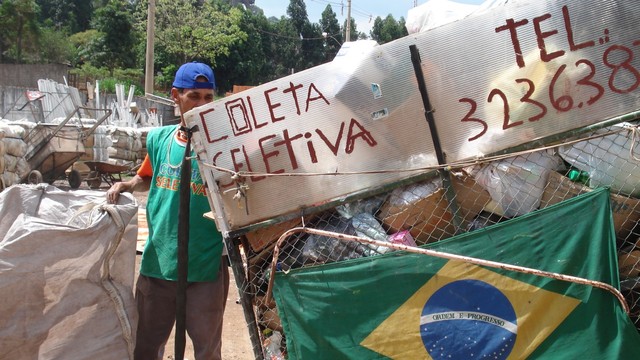Informal economy and green growth conference pinpoints need for new policy agenda
Participants focus on the need for a new framework to link informality and green growth.

A man transports logs by bicycle. Services provided by informal economies, such as small-scale logging, are often not integrated into plans for green growth (Photo: Jolien Schure/CIFOR, Creative Commons, via Flickr)
Experts from government, civil society, businesses and research organisations gathered in London on 25 February to discuss how the informal economy can be integrated into plans for inclusive green growth.
The conference highlighted the variety and vigour of informal economies around the world and the importance of linking informal economic activity to international strategies for promoting green growth and sustainable development.
Green growth aims to deliver economic sustainability, reduce poverty and protect the environment. The green growth agenda has become a key international priority and many countries are working on green growth plans. Yet many green growth strategies overlook a major driver of economic activity: informal economies.
In developing countries the informal sector employs more people than formal economic activity. The informal economy is broadly defined as economic activity that is not subject to government regulation or taxation. Many people working in the informal economy are essentially operating as micro, small and medium enterprises, making this the world's biggest private sector.
The London conference was titled 'The biggest 'private sector': what place for the informal economy in green and inclusive growth?'. It featured speakers from research, policy and practice, including from Ethiopia, Ghana, Indonesia and Brazil.
Benefits and challenges
Many speakers highlighted the lessons and benefits that the informal economy has to offer – such as providing employment and livelihoods to the poorest in society, and delivering key services and enhancing social cohesion.
The main aim of the conference was to start developing a new policy framework that will integrate informality into plans for inclusive green growth. By the end of the event, a set of key principles had emerged which could guide the way to a new agenda.
Establishing ways to protect, support, and document informal economic activity is a complex challenge. The conference looked at the challenges and highlighted some success stories of successful formalisation.
The conference also featured a photo exhibition that illustrated the diversity of informal economic activity around the world. The exhibition illustrated how people in the informal sector, from Colombia to India, are beginning to organise to protect their rights.
Conference resources
IIED published a detailed round-up of the conference using Storify - you can read it below.
Some of the presentations are available on IIED's Slideshare platform:
- Informality and green growth plans, by Emily Benson, IIED
- Recognition as a first step: informality in artisanal mining, by Gavin Hilson, University of Surrey
- Domestic tropical timber markets: informal, illegal and unsustainable? by Paolo Cerutti, CIFOR.
- Informality and rural transition – urbanisation, food economy and changing rural livelihoods, by Philipp Heinrigs, OECD Sahel and West Africa Club
- A different approach to policy, by Sally Roever, WIEGO Urban Policies.
Other resources
- Post-event report: Informality and inclusive green growth, Sian Lewis (2016), IIED Report
- A report of the event can also be found on IIED's SlideShare site
- Eleven audio recordings from the event are available to listen to on IIED's Audioboom site
- A full detailed list of all the sessions is in the conference programme (PDF)
- Selected images from the conference on IIED's Flickr site
- To keep in touch with the conference delegates, you can subscribe to a Twitter list of attendees.
About the organisers
The conference was organised by IIED, together with the Green Economy Coalition, Women in Informal Employment: Globalizing and Organizing (WIEGO), the Center for International Forestry Research (CIFOR) and the OECD's Sahel and West Africa Club.
Contact
To find out more about IIED's work on informal economies and sustainable development, contact Emily Benson (Emily.Benson@greeneconomycoalition.org), Senior researcher,IIED's Sustainable Markets Group


